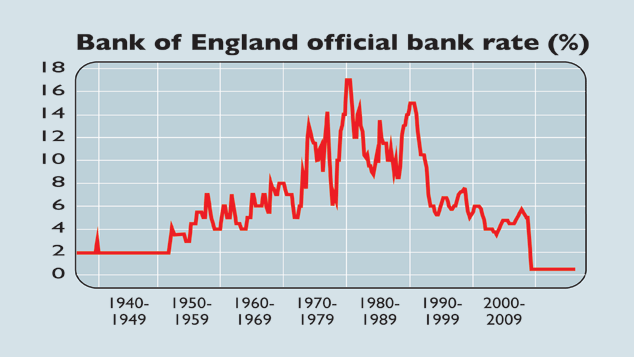Hold onto your cash – negative rates could be coming here soon
Negative interest rates are fast becoming established as a central bank tool. Matthew Lynn looks at the three triggers that could see interest rates going negative here.

Get the latest financial news, insights and expert analysis from our award-winning MoneyWeek team, to help you understand what really matters when it comes to your finances.
You are now subscribed
Your newsletter sign-up was successful
Want to add more newsletters?

Twice daily
MoneyWeek
Get the latest financial news, insights and expert analysis from our award-winning MoneyWeek team, to help you understand what really matters when it comes to your finances.

Four times a week
Look After My Bills
Sign up to our free money-saving newsletter, filled with the latest news and expert advice to help you find the best tips and deals for managing your bills. Start saving today!

Switzerland already has them. So does Sweden, the eurozone, and now Japan. With every month that passes, negative interest rates are becoming established as a tool of central-bank policy. They now cover more than a third of the global economy. True, they might be very weird, and create a through-the-looking-glass economy. But they are spreading fast.
Despite that, most people still seem to think the next move in British interest rates will be an increase, even if the date of it seems to keep getting postponed. But why does the UK have to be exempt from the trend? In fact, it is quite possible we might see negative rates here. There are three obvious triggers that could see the Bank of England join this great monetary policy experiment.
Deflation takes hold
Other commodities could fall with it. That could push the deflation rate down to minus 1%, or lower. In that situation, a negative interest rate might be the only tool the Bank has available to try and combat deflation. And keep in mind that if prices are falling by 1% a year, then a 0.5% negative rate is not so weird after all it is still a real rate of 0.5%.
MoneyWeek
Subscribe to MoneyWeek today and get your first six magazine issues absolutely FREE

Sign up to Money Morning
Don't miss the latest investment and personal finances news, market analysis, plus money-saving tips with our free twice-daily newsletter
Don't miss the latest investment and personal finances news, market analysis, plus money-saving tips with our free twice-daily newsletter

Sterling surges
That's great if you're taking a holiday in France or Italy, but terrible for our exporters and the eurozone remains our biggest single export market. So the Bank of England might feel compelled to match ECB rates to stop the currency climbing too high. After all, that is what drove the Swiss and Swedish decisions they're both also dependent on eurozone exports.
Global recession hits
Then central banks will feel they have to do something to stimulate demand. Since they didn't hike rates when the economy strengthened, they will have no other place to go but negative rates.
There are other scenarios as well. A house-price collapse could push the Bank of England into negative rates to keep the market alive. A banking failure might force the Bank to respond with negative rates to shore up the system. None of these are especially implausible. But whatever the potential trigger, negative rates are becoming widely accepted throughout the world and are a possibility here in the UK.
So if you have a tracker mortgage, hang onto it the bank might soon be paying you a few pounds every month for the privilege of lending you money. If you have any high-yielding bonds, hold onto those they might soon be worth a lot more. As for 50 quid notes, keep a small bundle in a safe somewhere. The zero interest on cash might be looking like the best home for your money one day soon.
Get the latest financial news, insights and expert analysis from our award-winning MoneyWeek team, to help you understand what really matters when it comes to your finances.

Matthew Lynn is a columnist for Bloomberg and writes weekly commentary syndicated in papers such as the Daily Telegraph, Die Welt, the Sydney Morning Herald, the South China Morning Post and the Miami Herald. He is also an associate editor of Spectator Business, and a regular contributor to The Spectator. Before that, he worked for the business section of the Sunday Times for ten years.
-
 Should you buy an active ETF?
Should you buy an active ETF?ETFs are often mischaracterised as passive products, but they can be a convenient way to add active management to your portfolio
-
 Power up your pension before 5 April – easy ways to save before the tax year end
Power up your pension before 5 April – easy ways to save before the tax year endWith the end of the tax year looming, pension savers currently have a window to review and maximise what’s going into their retirement funds – we look at how